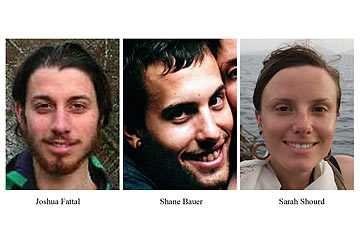
From left: Joshua Fattal, Shane Bauer and Sarah Shourd
The three Americans arrested in July for illegally crossing the border into Iran could hardly have chosen a worse time to go hiking in the mountains of northern Iraq without a local guide. Though merely left-wing activists on an ill-conceived adventure, Shane Bauer (who is also a freelance journalist), Sarah Shourd and Josh Fattal were accused of espionage this week by the Tehran prosecutor's office. And the fact that the charges coincide with accusations by Iran's regime that Western countries are trying to foment its overthrow in the wake of the country's disputed presidential elections in June does not bode well for the fate of the three hikers.
In the best-case scenario, the Iranian government would use the hikers' release as leverage in negotiations with the U.S. But Iran's leaders appear to have cooled somewhat on reaching out to the West, and that could be bad news for Americans in their custody: just last month, Iranian-American sociologist Kian Tajbaksh was sentenced to 15 years in prison in Iran for having once worked for a pro-democracy NGO and for being on an academic listserv — activities that the Iranian government claimed were covers for intelligence operations.
Tehran's high-profile prosecution of those it deems part of "foreign plots" comes at a moment when the Obama Administration is energetically seeking to engage on a range of issues, from Iran's nuclear program to Iraq and Afghanistan. While not explicitly rejecting U.S. overtures, the Iranian regime — whose decision-making is opaque and complex at the best of times — appears unable to respond coherently.
The turmoil in Tehran's corridors of power was highlighted by the regime's balking at approving a deal brokered by the International Atomic Energy Agency to send much of Iran's enriched-uranium stockpile abroad for processing into reactor fuel. Iran's negotiators appeared to have had their government's backing when they signed off on the agreement at talks in Vienna last month. But the pact, hailed as a tension-diffusing prelude to a larger deal between Iran and the West, appeared to stall when politicians from across the spectrum in Tehran denounced it as a scheme to steal Iran's nuclear stockpile and berated the Ahmadinejad government for considering it. Iran has yet to give a formal response, signaling instead that it wants to renegotiate the arrangements.
On Sunday, a state-owned Iranian TV network floated a compromise — supposedly from unnamed officials in Tehran — whereby Iran would swap a much smaller amount of its enriched uranium for reactor fuel. And on Wednesday, Ahmadinejad made a prime-time television address in which he called for nuclear cooperation with the West.
Although these tactics could merely be a means of drawing out negotiations in the hope of wearing down Western resolve, they could also signal that Ahmadinejad truly wants a deal, or at least is wary of overtly rejecting one. Faced with a challenge to his legitimacy at home in the form of an opposition movement that refuses to give up its allegations that his re-election was rigged, the President may be keen for a foreign policy success to bolster his status. Indeed, shortly after the Vienna talks in October, he portrayed the reactor-fuel deal as a victory for Iran and a de facto recognition of its right to enrich uranium.
Since then, the proposed deal has been criticized by Iranian conservatives and reformists, but counterproposals that leave most of Iran's enriched-uranium stockpile on its territory are unlikely to assuage Western concerns over Iran's intentions.
Further complicating prospects for a deal is the fact that Ahmadinejad doesn't have control over nuclear negotiations, which are the purview of Supreme Leader Ayatullah Ali Khamenei, who is known to be more skeptical of the possibility of a deal with the U.S. In remarks last week before the 30th anniversary of the takeover of the U.S. embassy in Tehran, Khamenei blasted the "arrogant" American attitude toward nuclear talks. "On the one hand, Americans talk of negotiations," he said. "On the other hand, they continue to threaten and say the negotiations must have our desired results or we will take measures."
Indeed, anti-Americanism is such an integral part of the founding ideology of the Islamic Republic that it remains to be seen if anyone within the political system can cut a deal with Washington without being branded a traitor. While criticism from hard-liners has been consistent (on Friday, a top cleric close to the government even called nuclear negotiations with the West "satanic"), moderates who had tried to cut deals with the West in the past — and were pilloried by conservatives at the time for doing so — are now just as skeptical of the Vienna deal, perhaps out of wariness that a nuclear deal with the West will strengthen the regime and help it crack down harder on domestic challengers.
Even Ahmadinejad can't seem to stay on message over negotiations with the U.S. The day before this week's call for nuclear cooperation with the West, he told a meeting of Muslim countries in Turkey that America had to choose between Israel and Iran. "We will clasp any hand that is extended sincerely toward us, but changes should be made in practice," he said. But whether sincerely or not, America's hand is outstretched — and it is Iran that can't seem to make up its mind whether to shake it.
